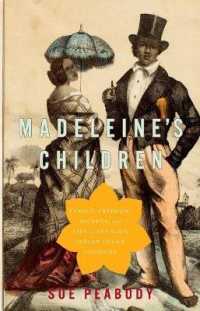- ホーム
- > 洋書
- > 英文書
- > Politics / International Relations
基本説明
By examining public opinion during the aftermath of Hurricane Katrina, Atkeson and Maestas show how media information interacts with emotion in shaping a wide range of political opinions about government and political leaders.
Full Description
Shocking moments in society create an extraordinary political environment that permits political and opinion changes that are unlikely during times of normal politics. Strong emotions felt by the public during catastrophes - even if experienced only vicariously through media coverage - are a powerful motivator of public opinion and activism. This is particularly true when emotional reactions coincide with attributing blame to governmental agencies or officials. By examining public opinion during one extraordinary event, the aftermath of Hurricane Katrina, Lonna Rae Atkeson and Cherie D. Maestas show how media information interacts with emotion in shaping a wide range of political opinions about government and political leaders. Catastrophic events bring citizens together, provide common experiences and information, and create opinions that transcend traditional political boundaries. These moments encourage citizens to re-examine their understanding of government, its leaders and its role in a society from a less partisan perspective.
Contents
1. Extraordinary events and public opinion; 2. A theoretical framework for systematically examining extraordinary events; 3. The media message environment and the emotional context of Hurricane Katrina; 4. Affective attributions: assigning blame during extraordinary times; 5. Federalism in a multiple message environment: are the appropriate leaders held accountable?; 6. Attributions of blame, political efficiency, and confidence in government; 7. Attributions, emotions, and policy consequences; 8. Extraordinary events and public opinion: some broader perspectives.







